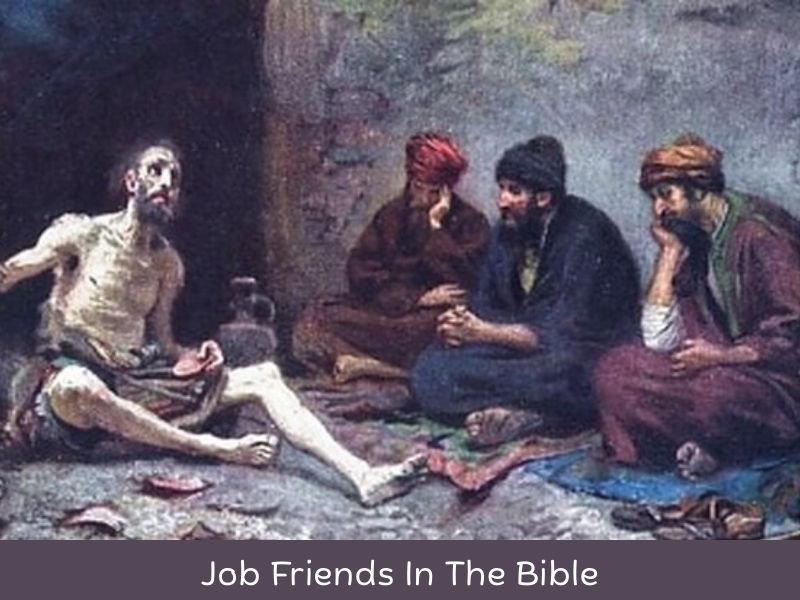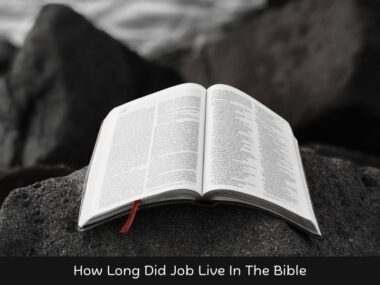The identity and person of the friends of Job in the Bible remain among the most debated figures in biblical literature. Eliphaz, Bildad, Zophar, and later Elihu played pivotal roles in the Book of Job, reflecting theological insights and human shortcomings alike. The story of Job’s Friends In The Bible transcends ancient narrative, offering powerful lessons about empathy, counsel, and divine justice. While many view them as misguided comforters, their words continue to stir reflection on how we approach pain and friendship.
This article explores everything you need to know about Job’s Friends In The Bible—from their identities to their theological positions, their interactions with Job, and the consequences of their words. Whether you’re a Bible scholar, spiritual seeker, or someone grappling with suffering, the narrative of Job’s Friends In The Bible offers transformative insights.
Who Were Job’s Friends?
Eliphaz the Temanite
Among Job’s Friends In The Bible, Eliphaz stands out as the first to speak and perhaps the most composed. Coming from Teman—a region known for wisdom—Eliphaz adopts a philosophical and mystical tone. He relies heavily on visions and dreams, often attempting to comfort Job with spiritual explanations rooted in tradition. His primary message is that suffering is often a result of personal sin—a recurring theme among Job’s Friends In The Bible.
Eliphaz believes he is doing the right thing. He urges Job to consider that divine punishment is never without cause. For readers exploring Job’s Friends In The Bible, Eliphaz represents the archetype of a friend who means well but lacks a full understanding of the situation.
Bildad the Shuhite
Another central figure among Job’s Friends In The Bible is Bildad the Shuhite. He is direct and less philosophical than Eliphaz. Bildad leans on ancestral wisdom, invoking the authority of the past. He often points to the fate of the wicked as justification for Job’s suffering.
Bildad’s emphasis is clear: if Job is suffering, then he must have sinned. Like the other Job Friends In The Bible, he fails to grasp the heavenly context of Job’s trials. Yet his passionate appeals show a genuine concern, though misinformed, for Job’s restoration.
Zophar the Naamathite
Perhaps the harshest among Job’s Friends In The Bible is Zophar. He is unyielding, blunt, and unwavering in his accusations. Unlike Eliphaz or Bildad, Zophar shows little restraint. He insists that Job’s suffering is deserved and even argues that Job likely deserves worse.
Zophar’s rigid theological stance reflects the dangers of applying doctrine without empathy. Among Job Friends In The Bible, Zophar’s voice serves as a cautionary tale against spiritual arrogance masked as truth.
Elihu the Buzite
Though not one of the three original Job Friends In The Bible, Elihu plays a critical role later in the narrative. Younger and initially silent, Elihu becomes increasingly frustrated with both Job and his friends. He believes Job is self-righteous and that the others have failed to provide a compelling answer.
Elihu introduces a fresh angle: suffering can be a means of divine instruction rather than punishment. While he lacks the divine endorsement given to Job, Elihu’s message complicates the simplistic views held by the other Job Friends In The Bible.
The Friends’ Theological Perspectives
Understanding the beliefs held by Job’s friends in the Bible is essential to grasping the depth and nuance of their extended dialogue with him. These friends—Eliphaz, Bildad, and Zophar—represent a deeply entrenched and traditional theology that equates human suffering with divine retribution. According to their worldview, all adversity is ultimately the result of sin, and prosperity is evidence of righteousness. This retributive justice framework leads them to wrongly conclude that Job’s severe afflictions must be punishment for some hidden wrongdoing. Their persistent assertions reveal a rigid belief system incapable of accommodating the idea of innocent suffering.
Rather than offering genuine comfort, they become accusatory, urging Job to repent for transgressions he insists he has not committed. Their theology reflects a broader ancient perspective that viewed God’s justice as immediate and transactional, unable to account for the complexities of divine providence or the existence of undeserved hardship. As such, their speeches provide crucial insight into the limitations of conventional wisdom when confronted with profound human suffering.
Doctrine of Retribution
Job Friends In The Bible uniformly cling to the doctrine of retribution—the belief that God blesses the righteous and punishes the wicked. This idea was deeply rooted in ancient Hebrew thought and informs their every argument. Eliphaz, Bildad, and Zophar all see Job’s afflictions as clear evidence of wrongdoing.
This doctrine is not without biblical precedent. Proverbs and Deuteronomy, for instance, suggest a link between righteousness and prosperity. However, the story of Job Friends In The Bible challenges this theology, exposing its limitations when applied without discernment.
Application to Job’s Situation
Job Friends In The Bible misread the situation entirely. Their inability to consider any reason for suffering apart from sin causes them to wound rather than comfort. They fail to acknowledge that Job’s plight is a test of faith orchestrated by divine allowance—not a punishment for wrongdoing.
By strictly applying this theology, Job’s Friends In The Bible unwittingly become instruments of emotional and spiritual harm. They reflect a broader human tendency to assign blame in the face of suffering.
Critique of Their Theology
The primary error of Job’s Friends In The Bible lies in their confidence. They speak on behalf of God without divine insight. Their dogmatism prevents them from seeing the truth and offering the empathy Job so desperately needs.
In critiquing the theological stance of Job Friends In The Bible, readers are urged to consider the complexity of suffering. Not all pain is punitive. Sometimes, it is formative, revealing, or mysterious. The friends’ failure to grasp this nuance serves as a warning to us all.
Job’s Response to His Friends
Job’s Friends In The Bible provoke intense emotional and intellectual reactions from Job. Initially silent, Job becomes increasingly vocal and defensive as the dialogues unfold.
Emotional Reactions
The words of Job’s Friends In The Bible deeply wound Job. He feels betrayed, isolated, and misunderstood. Their accusations, rather than soothing his grief, compound it. Job accuses them of being “miserable comforters” and questions their loyalty.
These emotional responses highlight the inadequacy of Job Friends In The Bible to provide true support. In times of crisis, words without empathy can be more damaging than silence.
Counterarguments
Job does not accept the verdict passed by Job’s Friends In The Bible. He maintains his innocence and challenges their assumptions. His arguments reveal a profound understanding of divine justice, even as he wrestles with his pain.
Job’s theological reflections often surpass those of his friends. While Job’s Friends In The Bible cling to tradition, Job dares to ask hard questions. His intellectual honesty becomes a model for faithful inquiry.
Significance in the Narrative
The debate between Job and his friends forms the core of the Book of Job. These exchanges expose not only differing worldviews but also the fragility of friendship under pressure. Through these dialogues, readers see the emotional and theological turmoil that results when human counsel replaces divine wisdom.
God’s Judgment on Job’s Friends
Perhaps the most dramatic moment involving Job’s Friends In The Bible occurs when God enters the scene and passes judgment.
Divine Rebuke
In Job 42:7–9, God directly rebukes Job Friends In TheJob’sble. He states clearly that they “have not spoken of me what is right.” This divine verdict vindicates Job and exposes the friends’ error. Despite their pious intentions, Job Friends In TheJob’sble misrepresented God.
This moment is pivotal. It clarifies that theology must align with divine truth, not merely human assumptions. It also reminds readers that even well-meaning people can be wrong in profound ways.
Restoration Process
Interestingly, Job’s Friends In The Bible are not cast away. Instead, God instructs them to offer sacrifices and seek Job’s intercession. This requirement highlights a deep truth: restoration is possible, but it requires humility and repentance.
Job, in turn, prays for his friends, demonstrating forgiveness. This act of grace completes the arc of Job’s Friends In The Bible—from accusers to recipients of mercy.
Implications for Divine Justice
The judgment on Job’s Friends In The Bible reveals the nature of divine justice. God does not merely reward doctrine; He honours truth, humility, and repentance. The rebuke serves as a reminder that an accurate representation of God matters deeply.
Lessons for Contemporary Readers
Though thousands of years old, the story of Job’s friends in the Bible remains profoundly relevant and instructive in today’s complex and often fractured world. This ancient narrative compels us to critically examine how we offer counsel to those in distress, urging a shift from judgment to empathy, from assumptions to attentive listening. It challenges us to reassess how we interpret suffering, not as a simplistic consequence of wrongdoing, but as a multifaceted human experience that may defy explanation.
Furthermore, the story invites us to reflect on the depth and authenticity of our relationship with God, especially when divine silence seems to accompany pain. It presses us to question whether our theology can withstand life’s harshest realities without resorting to blame or presumption. Equally, it calls into focus how we relate to others during their trials: do we speak with compassion or condemnation? In an era marked by quick judgments and surface-level understanding, the account of Job’s friends serves as a sobering reminder to lead with humility, discernment, and grace when walking alongside the suffering.
Discernment in Counsel
Job Friends In The Bible teach us the importance of wise counsel. Words meant to heal can harm if delivered without empathy. In times of crisis, silence and presence may be more powerful than sermons.
Today, we are often quick to offer opinions or quote scripture in ways that mimic Job’s Friends In The Bible. Their story urges caution, humility, and deep listening.
Understanding Suffering
Job Friends In The Bible represent a simplistic view of suffering—one that still permeates many religious and cultural spaces. They remind us that not all suffering is punishment. Sometimes, the righteous suffer without apparent cause.
The story invites readers to expand their theology of suffering, embracing mystery and trusting in a God who is just, even when His ways are hidden.
Faith and Integrity
Perhaps the greatest and most enduring lesson from the narrative of Job’s friends in the Bible is found in Job’s unwavering moral and spiritual integrity. Despite relentless psychological pressure and emotional distress, Job steadfastly refuses to confess to a sin he did not commit, thereby exemplifying a profound commitment to truth and righteousness. His resilience and refusal to capitulate under the weight of false accusations challenge contemporary readers to hold fast to their convictions, even when confronted by misunderstanding, societal judgment, and intense personal suffering.
Moreover, Job’s ultimate act of forgiveness toward his friends serves as a powerful illustration of redemptive grace in action—grace that can restore broken relationships and heal emotional wounds. Job’s friends, despite their good intentions, failed him at his lowest point, offering condemnation instead of comfort. Yet, in an extraordinary display of mercy, Job chooses forgiveness over resentment, embodying the kind of divine compassion that transcends human flaws. This moment reveals the spiritual maturity required to extend grace to those who have wounded us and challenges us to emulate such generosity of spirit.
Conclusion
The tale of Job’s Friends In The Bible is one of profound theological and emotional depth. These friends, flawed yet relatable, reflect their struggles to understand suffering and offer meaningful comfort. Though they failed the Job, their story continues to teach us about the complexity of human relationships and the necessity of divine truth.
As we reflect on Job’s Friends In The Bible, may we strive to be friends who listen more than we speak, who counsel with humility, and who seek to understand rather than to judge. The Book of Job is not just a story about suffering—it is a guide to compassionate friendship, truthful theology, and enduring faith. Let the legacy of Job’s Friends In The Bible refine how we walk with others through pain, how we speak on behalf of God, and how we represent the Gospel in times of trial.







